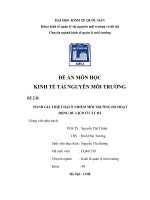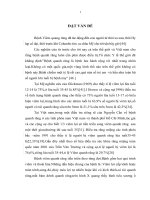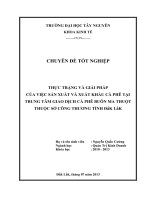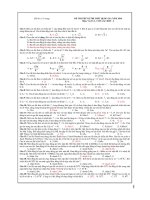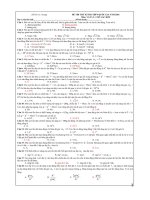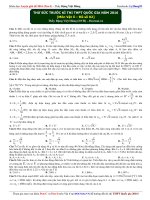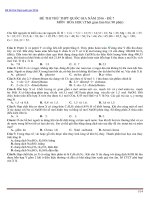Tải Đề thi thử THPT Quốc gia năm 2016 môn Tiếng Anh trường THCS & THPT Đông Du, Buôn Ma Thuột - Đề số 2 - Đề thi thử Đại học môn Tiếng Anh năm 2016
Bạn đang xem bản rút gọn của tài liệu. Xem và tải ngay bản đầy đủ của tài liệu tại đây (131.24 KB, 7 trang )
<span class='text_page_counter'>(1)</span><div class='page_container' data-page=1>
<b>PHỊNG GD&ĐT TP. BN MA THUỘT</b>
<b>TRƯỜNG THCS&THPT ĐƠNG DU</b>
<i>---(Đề thi có 6 trang)</i>
<b>ĐỀ THI THỬ THPT QUỐC GIA NĂM 2016</b>
<b>MÔN THI: TIẾNG ANH</b>
<i>Thời gian làm bài: 90 phút – không kể thời gian giao đề</i>
<b>PHẦN TRẮC NGHIỆM: (8 điểm)</b>
<i><b>Mark the letter A, B, C, or D on your answer sheet to indicate the word whose underline is pronounced differently</b></i>
<i><b>from the rest.</b></i>
<b>Question 1: A. opened B. played C. proved D. regarded</b>
<b>Question 2: A. same B. taste C. swallow D. page</b>
<i><b>Mark the letter A, B, C, or D on your answer sheet to indicate the word that differs from the rest in the position of</b></i>
<i><b>the main stress.</b></i>
<b>Question 3: A. Television B. Information C. Economic D. Engineer</b>
<b>Question 4: A. Achievement B. Argument C. Confinement D. Involvement</b>
<b>Question 5: A. Teacher B. Prefer C. Offer D. Flower</b>
<i><b>Mark the letter A, B, C, or D on your answer sheet to indicate the correct answer to each of the following</b></i>
<i><b>questions.</b></i>
<b>Question 6: I will stand here and wait for you ______ you come back.</b>
<b>A. because B. though C. so D. until</b>
<b>Question 7: Let’s begin our discussion now, ______?</b>
<b>A. shall we B. will we C. don’t we D. won’t we</b>
<b>Question 8: Of all the factors affecting agricultural yields, weather is the one ______ the most.</b>
<b>A. that influences farmers B. farmers that is influences</b>
<b>C. why farmers influence it D. it influences farmers</b>
<b>Question 9: It gets _______ to understand what the professor has explained.</b>
<b>A. the more difficult B. difficult more and more</b>
<b>C. more difficult than D. more and more difficult</b>
<b>Question 10: I was doing my homework ______ the light went out.</b>
<b>A. after B. before C. while D. when</b>
<b>Question 11: He carried a(n)_________ driving license.</b>
<b>A. untrue B. unfaithful C. artificial D. false</b>
<b>Question 12: John: “I’ve passed my final exam.” - Tom: “______”</b>
<b>A. That’s a good idea. B. Good luck. </b>
<b>C. It’s nice of you to say so. D. Congratulations!</b>
<b>Question 13: _______, we tried our best to complete it.</b>
</div>
<span class='text_page_counter'>(2)</span><div class='page_container' data-page=2>
<b>C. Difficult as the homework was D. As though the homework was difficult</b>
<b>Question 14: Students are often advised to look at the first and last_________of a book before attempting to read it in</b>
details.
<b>A. paragraphs B. headings C. chapters D. titles</b>
<b>Question 15: ______ ten minutes earlier, you would have got a better seat.</b>
<b>A. Had you arrived B. If you arrived C. Were you arrived D. If you hadn’t arrived</b>
<b>Question 16: The song has ______ been selected for the 22</b>nd<sub> Sea Games, Vietnam.</sub>
<b>A. officially B. office C. official D. officer</b>
<b>Question 17: Edith Harlow has kindly agreed ______. You should ask him.</b>
<b>A. to helping B. to help C. help D. helping</b>
<b>Question 18: People usually can get sufficient ______ of the calcium their bodies need from the food they consume.</b>
<b>A. variety B. source C. amount D. number</b>
<b>Question 19: It is possible ______ may assist some trees in saving water in the winter.</b>
<b>A. to lose leaves B. that the loss of leaves</b>
<b>C. the leaves are lost D. when leaves have lost</b>
<b>Question 20: Kitchen appliances called blenders became ______ in the 1930s, when Stephen B. Poplawski</b>
developed a machine that excelled at making his favorite drink.
<b>A. establish B. established C. which establish D. establishing</b>
<b>Question 21: There’s somebody walking behind us. I think we are ______.</b>
<b>A. followed B. being followed C. following D. being following</b>
<b>Question 22: Chosen as the nation’s capital at the end of the American Civil War, ______ the city of over a million</b>
people.
<b>A. Washington, DC is now B. for Washington, DC,</b>
<b>C. Washington, DC, D. now in Washington, DC,</b>
<b>Question 23: It is a top secret. You _______ tell anyone about it.</b>
<b>A. won't B. needn't C. mustn't D. mightn't</b>
<b> Question 24: Although he hadn’t spoken French for many years, he picked it _____ again after a few weeks.</b>
<b>A. over B. on C. up D. through</b>
<i><b>Read the following passage and mark the letter A, B, C or D on your answer sheet to indicate the correct answer to</b></i>
<i><b>each of the questions. </b></i>
</div>
<span class='text_page_counter'>(3)</span><div class='page_container' data-page=3>
or the most recent residents of the house can be a matter of personal interpretation. Winterthur remains, then, a house
in which a collection of furniture and architectural elements has been assembled. Like an English country house, it is
an organic structure; the house, as well as the collection and manner of displaying it to the visitor, has changed over
the years. The changes have coincided with developing concepts of the American arts, increased knowledge on the
part of collectors and students, and a progression toward the achievement of a historical effect in period-room
displays. The rooms at Winterthur have followed this current, yet still retained the character of a private house.
The concept of a period room as a display technique has developed gradually over the years in an effort to present
works of art in a context that would show them to greater effect and would give them more meaning for the viewer.
Comparable to the habitat group in a natural history museum, the period room represents the decorative arts in a lively
and interesting manner and provides an opportunity to assemble objects related by style, date, or place of manufacture.
<b>Question 25: What does the passage mainly discuss?</b>
<b>A. Historical furniture contained in Winterthur </b>
<b>B. How Winterthur compares to English country houses</b>
<b>C. Elements that make Winterthur an unusual museum </b>
<b>D. The reason that Winterthur was redesigned</b>
<b>Question 26: The phrase "devoted to" in line 1 is closest in meaning to ________ .</b>
<b>A. specializing in B. sentimental about C. surrounded by D. successful in</b>
<b>Question 27: What happened at Winterthur between 1929 and 1931?</b>
<b>A. The old furniture was replaced B. The estate became a museum</b>
<b>C. The owners moved out D. The house was repaired</b>
<b>Question 28: What does the author mean by stating "the impression of a lived-in house is apparent to the visitor"?</b>
<b>A. Few people visit Winterthur</b>
<b>B. The furniture at Winterthur looks comfortable</b>
<b>C. Winterthur does not look like a typical museum</b>
<b>D. Winterthur is very old</b>
<b>Question 29: The word "assembled" in line 9 is closest in meaning to ________ .</b>
<b>A. summoned B. appreciated</b>
<b>C. fundamentally changed D. brought together</b>
<b>Question 30: The word "it" in line 10 refers to _________ .</b>
<b>A. collection B. English country house</b>
<b>C. visitor D. Winterthur</b>
<b>Question 31: The word "developing" in line 11 is closest in meaning to _________ .</b>
<b>A. evolving B. exhibiting C. informative D. traditional</b>
<b>Question 32: According to the passage, objects in a period room are related by all of the following EXCEPT</b>
_________ .
</div>
<span class='text_page_counter'>(4)</span><div class='page_container' data-page=4>
<b>C. past ownership D. style</b>
<b>Question 33: What is the relationship between the two paragraphs in the passage?</b>
<b>A. Paragraph 2 explains a philosophy of art appreciation that contrasts with that explained in Paragraph 1.</b>
<b>B. Paragraph 2 explains a term that was mentioned in Paragraph 1.</b>
<b>C. Each paragraph describes a different historical period</b>
<b>D. Each paragraph describes a different approach to the display of objects in a museum</b>
<b>Question 34: Where in the passage does the author explain why displays at Winterthur have changed?</b>
<b>A. lines 6-8 B. lines 4-5 C. lines 1-2 D. lines 10-12</b>
<i><b>Read the following passage and mark the letter A, B, C, or D on your answer sheet to indicate the correct answer</b></i>
<i><b>for each of the blanks.</b></i>
<b>CARNIVOROUS PLANTS</b>
All plants rely on nutrients taken from the soil in order to survive. However, in areas where the soil does not contain
enough (35)_____ nutrients, some plants have adapted to (36) _____ their diets from another source: living
organisms. Though they are few in number, carnivorous plants are (37)_____ fascinating beings that “eat” anything
from one-celled organisms to insects in order to survive. They are commonly found in marshlands. Carnivorous plants
feature one of several types of “traps” to ensnare prey, which they consume to make up for nutrients that may be
missing from the soil. While there are over 400 species of carnivorous plants in the world today, some are more
(38)_____ than others.
The most well-known of these plants are the snap traps, which include the Venus flytrap. Snap traps are easily
identified by their leaves, which are separated into two lobes that have the ability to fold together. Inside the lobes, the
surface is covered with tiny hairs that are (39) _____ to movement. When the plant’s prey brushes against the hairs, it
triggers a closing mechanism that rapidly brings the two lobes together, trapping the prey (40)_____ inside. The
response of the traps is phenomenal (41)_____ speed: the time between triggering the hairs and snapping shut is less
than a second. As the prey struggles inside the trap, it only triggers more hairs, causing the leaves to tighten their (42)
_____. The plant then secrets liquid chemicals from special glands into the trap to dissolve the prey and absorb all of
its nutrients. Besides the Venus flytrap, only one other type of snap trap exists today, (43)_____ to as the waterwheel
plant. The two share a common ancestor and differ only in a few ways. For instance, the waterwheel is an aquatic
plant, while the flytrap is exclusively terrestrial. In addition, the flytrap feeds primarily on arthropods like spiders,
while the waterwheel lives (44)_____ simple invertebrates, like certain types of plankton.
<b>Question 35: A. critical B. vital C. crucial D. indispensable</b>
<b>Question 36: A. modify B. enlarge C. augment D. supplement</b>
<b>Question 37: A. nonetheless B. though C. contradictorily D. yet</b>
<b>Question 38: A. prevalent B. current C. domineering D. prevailing</b>
<b>Question 39: A. vulnerable B. liable C. prone D. sensitive</b>
<b>Question 40: A. closely B. securely C. irreplaceably D. steadily</b>
</div>
<span class='text_page_counter'>(5)</span><div class='page_container' data-page=5>
<b>Question 42: A. fist B. hold C. seizure D. grip</b>
<b>Question 43: A. denoted B. referred C. indicated D. implicated</b>
<b>Question 44: A. off B. onto C. though D. with</b>
<i><b>Mark the letter A, B, C, or D on your answer sheet to indicate the word or phrase that is CLOSEST in meaning to</b></i>
<i><b>the underlined part in each of the followings. </b></i>
<b>Question 45: Few businesses are flourishing in the present economic climate.</b>
<b>A. taking off B. setting up C. growing well D. closing down</b>
<b>Question 46: The dog saw his reflection in the pool of water .</b>
<b>A. imagination B. bone C. leash D. image</b>
<b>Question 47: At times, I look at him and wonder what is going on in his mind.</b>
<b>A. sometimes B. always C. hardly D. never</b>
<b>Question 48: Humans depend on species diversity to provide food, clean air and water, and fertile soil for</b>
agriculture.
<b>A. destruction B. contamination C. fertilizer D. variety</b>
<b>Question 49: I couldn’t see what she was doing. It was so dark down there.</b>
<b>A. make out B. make up C. make for D. make from</b>
<i><b>Mark the letter A, B, C, or D on your answer sheet to show the underlined part that needs correction.</b></i>
<b>Question 50: Several (A) people have apparent (B) tried to change the man’s mind (C), but he refuses to listen (D).</b>
<b>Question 51: Not until (A) I was on my way (B) to the airport that I realized (C) I had left my passport at home (D).</b>
<b>Question 52: Students suppose (A) to read all the questions (B) carefully and find out (C) the answers to them (D).</b>
<b>Question 53: The disposable (A) camera, a single- used camera (B) preloaded with print film (C) has appeared (D) in</b>
the late 1980s and has become very popular.
<b>Question 54: Public health (A) experts say that the money one spends avoiding illness (B) is less than the cost (C) of</b>
to treat sickness (D).
<i><b>Read the following passage and mark the letter A, B, C, or D on your answer sheet to indicate the correct answer</b></i>
<i><b>to each of the questions.</b></i>
The goal of Internet-based encyclopedia Wikipedia (www.wikipedia.org) is to give everyone on the planet
access to information. Like other encyclopedias, Wikipedia contains lots of information: more than 2.5 million articles
in 200 different languages covering just about every subject. Unlike other encyclopedias, however, Wikepedia is not
written by experts, but by ordinary people.These writers are not paid and their names are not published. They
contribute to Wikipedia simply because they want to share their knowledge.
</div>
<span class='text_page_counter'>(6)</span><div class='page_container' data-page=6>
updated, like Microsoft’s Encarta. However, even Internet-based encyclopedias like Encarta were written by paid
experts. At first, Wikipedia, the brainchild of Jimmy Wales, a businessman in Chicago, was not so different from
these. In 2001, he had the idea for an Internet-based encyclopedia that would provide information quickly and easily
to everyone. Furthermore, that information would be available free, unlike other Internet encyclopedias at that time.
But Wales, like everyone else, believed that people with special knowledge were needed to write the articles,
and so he began by hiring experts. He soon changed his approach, however, as it took them a long time to finish their
work. He decided to open up the encyclopedia in a radical new way, so that everyone would have access not only to
the information, but also to the process of putting this information online. To do this, he used what is known as
“Wiki” software (from the Hawaiian word for “fast”), which allows users to create or alter content on web page. The
system is very simple: When you open the web site, you can simply search for information or you can log on to
become a writer or editor of articles. If you find an article that interests you – about your hometown, for example –
you can correct it or expand it. This process goes on until no one is interested in making any more changes.
<b>Question 55: Wikipedia is a(n) ____. </b>
A. book B. journal C. article D. dictionary
<b>Question 56: Wikipedia is written by____.</b>
A. paid written B. millionaires C. normal people D. world experts
<b>Question 57: The phrase “these writers” in the first paragraph refers to ____.</b>
A. ordinary readers B. ordinary people
C. encyclopedia experts D. every subject
<b>Question 58: The phrase “the word” in the second paragraph refers to____.</b>
A. knowledge B. encyclopedia C. writing D. collection
<b>Question 59: Microsoft’s Encarta is cited in the passage as an example of ____.</b>
A. CD-ROM dictionary B. printed encyclopedia
C. online encyclopedia D. updateable online encyclopedia
<b>Question 60: The word “brainchild” in the second paragraph of the passage can be best replaced by____.</b>
A. born B. child C. product D. father
<b>Question 61: The word “approach” in the third paragraph of the passage means____.</b>
A. idea B. time C. method D. writing
<b>Question 62: The user of Wikipedia can do all of the following EXCEPT____.</b>
A. have access to information B. determinate the website
C. modify information D. edit information
<b>Question 63: We can say that Jimmy Wales____.</b>
A. became very famous after the formation of Wikipedia B. is the father of Wikipedia
C. made a great profit from Wikipedia D. decides who can use Wikipedia
<b>Question 64: Wiki software enables ____.</b>
</div>
<span class='text_page_counter'>(7)</span><div class='page_container' data-page=7>
C. limited access D. editing
<b>PHẦN TỰ LUẬN: (2 điểm)</b>
<i><b>Part 1. Rewrite the following sentences in order to keep their original meanings.</b></i>
<b>Question 65: Mary is pretty but Camry is prettier.</b>
→ Camry is the ………...
<b>Question 66: This is the best film I’ve ever seen.</b>
→ I’ve ………..………
<b>Question 67: My school has over 2,000 students.</b>
→ There are ………..………….………..
<b>Question 68: People say that the plane of Germanwings crashed into the mountains.</b>
→ It is ………..………
<b>Question 69: He tries to learn English well so as to find a good job.</b>
</div>
<!--links-->
